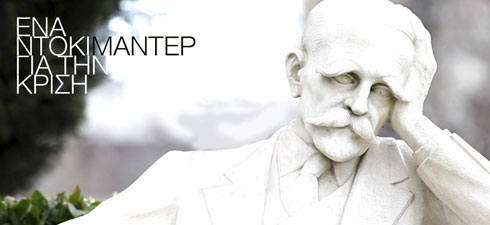Everyone on the web is talking about Debtocracy, a documentary on the Greek crisis by journalists Katerina Kitidi and Ari Hatzistefanou. The film which was financed with the makers’ own funds and donations from friends, has been made freely available on debtocracy.gr, where it has received close to 600,000 visitors in less than ten days, and sparked ongoing debates on Facebook, Twitter and a number of blogs.
The main participants in the documentary (approximately 200 public figures) have called for the creation of an international audit commission to analyse how Greece’s debt was created and initiate proceedings against those responsible. They also argue that Greece has the right to refuse to repay “unjustified debt,” that is to say debt that was undertaken in the course of corrupt actions that were counter to the interests of Greek society.
Debtocracy is a political act. It is a one-sided take on the events that led Greece to the verge of bankruptcy. All of the featured opinions are closely aligned and presented without counterarguments — a deliberate choice on the part of the makers who explain their point of view in the film’s opening minutes: “In nearly 40 years, two parties, three political families and a number of big bosses drove Greece to bankruptcy. Now they have stopped paying its citizens in order to save its creditors.”
"Why didn’t you give the people you hold to blame a hearing?"
The documentary’s authors chose not to present the opinions of those who they consider to be “accessories” to state bankruptcy. Greece’s prime ministers and finance ministers of the last ten years are viewed as links in a chain of accomplices which pulled the country over the edge.
The Managing Director of the IMF, Dominique Strauss-Kahn (DSK), who has likened himself to a doctor called on to cure the Greek economy, is compared to the dictator George Papadopoulos [who was the country’s prime minister under the military junta of 1967-1974] — a parallel that is established with remarkable ease from the outset of the film. However, at no point is DSK given the right of reply.
In response to the question “Why didn’t you give the people you hold to blame a hearing?” one of the film makers, Katerina Kitidi, remarks: “that is an excellent question for the many media outlets which have systematically presented a one-sided view of the situation. We believe that ours is an approach which has been badly needed for quite some time.”
Citing the example of Ecuador and Argentina
For her colleague Aris Hatzistefanou, the documentary’s independence is what counts: “We didn’t have the choice,” he points out. “In order to avoid constraints on the content that would have certainly been imposed by production companies, institutions and other parties, we turned to the public to finance the cost of production. The documentary belongs to our “co-producers” who donated via the Internet, and that is why we have not had any trouble with rights issues. In any case, our goal is to reach the widest possible audience,” he explains.
Citing the example of Ecuador and Argentina, the documentary argues that an audit commission report could be used as a negotiating tool to obtain the write-off of part of the debt and to unfreeze pensions and wages.
“We aimed to highlight the example of countries that said ‘no’, when the IMF and foreign creditors had brought their citizens to their knees. With this in mind, we spoke to the people who conducted the audit in Ecuador, which proved that a large amount of the debt was illegal,” remarks Katerina Kitidi. However, Debtocracy fails to take into account obvious differences between Ecuador and Greece — in particular the fact that Ecuador has oil.
Was this article useful? If so we are delighted!
It is freely available because we believe that the right to free and independent information is essential for democracy. But this right is not guaranteed forever, and independence comes at a cost. We need your support in order to continue publishing independent, multilingual news for all Europeans.
Discover our subscription offers and their exclusive benefits and become a member of our community now!












